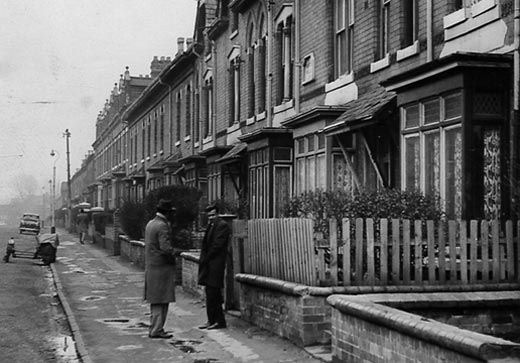UK: Immigration, population pressure and social inequity: Migration Watch

Illustration source was http://www.connectinghistories.org.uk/Learning%20Packages/Social%20Justice/social_justice_lp_03a.asp
September 23, 2009
Uncontrolled immigration blocks social housing for native-born
New research by Migrationwatch, based on official figures, shows the pressure that uncontrolled immigration has placed – and will place – on social housing.
Speaking at the annual conference of the National Housing Federation in London on September 23, Migrationwatch chairman, Sir Andrew Green, said that in the last ten years, the number of UK born tenants in social housing in the UK has fallen by about 1.2 million while non UK-born tenants have increased by 300,000. As a result, the proportion of foreign born has increased from 7.2% to 11.1% - an increase of 54%.
Migrants who arrived here in the last five years and are not refugees are not yet eligible to apply for social housing but could become so in future years if they are granted settlement. Grants of settlement for non-EEA nationals are running at about 160,000 a year, giving a potential pool of 800,000 although, of course, by no means all will apply.
The rise in the proportion of foreign born in social housing is greater because the supply of social housing has not merely failed to meet the demand in a period of very high immigration, but the stock of social housing has actually fallen over the last ten years.
In England, the number of social housing units has fallen from 4.4 to 3.9 million in the last ten years.
Immigration has added nearly three million to the population of the UK over the same period, mainly in England.
The waiting list for social housing in England has risen by 80% in the six years 2002-8, up to 1.8 million, with a sharp peak in 2003-4. Recent research by the National Housing Federation, published in March, suggests that the waiting list could approach two million in 2011.
Earlier this month the Government announced plans to build 2,000 homes in England – which it described as the biggest social housing building project in England for "over 20 years".
By way of comparison, this would be enough to meet the projected household formation of new immigrants for just over a week.
The pressure on social housing is set to continue:
The population of the UK is growing rapidly - twice as fast as in the 1990's and three times as fast as in the 1980's. By 2028 it is set to reach and then exceed 70 million.
70% of this increase is due to immigration. In other words, unless it is controlled, immigration will add the equivalent of 7 cities the size of Birmingham over the next 20 years or so.
Immigration is the major factor in household formation – 40% or, on average, nearly 2,000 new households a week - and it is the only one that can be influenced by government. Unless immigration is brought under control, we will need to build one home every six minutes for new immigrants for the next 25 years.
Commenting on the research, Sir Andrew said:
`In the debate about housing, immigration is a huge elephant in the room. Pressures on the green belt, the need for more affordable housing, overcrowding – all of these are made worse by large scale, uncontrolled immigration. Unless the next Government makes a clear commitment not to allow the population to hit 70 million, and to build its immigration policies around that commitment, we will need to find the money and space to build seven cities the size of Birmingham in the next 25 years just to house new immigrants. We are sitting on top of a population timebomb. It must be a major priority of the next Government to defuse it.'
Commenting on this press release, Australian population sociologist, Sheila Newman, said,
"These trends are relevant to most English speaking countries since most have inherited from the United Kingdom housing and population and citizenship policies and laws. She said that many English-speaking writers commenting on population growth in anglophone countries remain unaware that on the Continent - western Europe - the roman-based Napoleonic system means that immigration is rarely 'permanent' and housing of all kinds is seen as a social obligation and cost, rather than a private profit industry. This means that in non-anglophone Europe housing is a constraint on population growth."
She added,
"It is important for the people in the English speaking settlement countries to realise that there is a much better system elsewhere."
For more on that other system see The Growth Lobby and its Absence, particularly Chapter 7 and the submission to the Productivity Commission's First Home Buyers affordability Inquiry (which quickly covers many different housing systems) which are all available on-line here, plus further discussions such as this one.

Recent comments